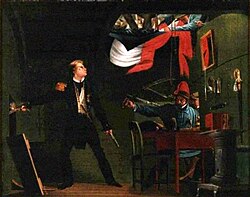Jan van Speyk
Jan van Speyk | |
|---|---|
 Van Speijk shoots into a barrel of gunpowder, blowing up his own ship. | |
| Born | January 31, 1802 Amsterdam, Batavian Republic |
| Died | February 5, 1831 (aged 29) Harbour of Antwerp, Belgium |
| Buried | |
| Allegiance | |
| Service | Dutch Navy |
| Rank | Lieutenant |
| Commands | Gunboat No.2 |

Jan Carolus Josephus van Speijk, also written Van Speyk (31 January 1802 – 5 February 1831), was a Dutch naval lieutenant who became a hero in the Netherlands for his opposition to the Belgian Revolution.
Early life
Born in Amsterdam in 1802, van Speijk was orphaned only a few weeks after his birth. When he was 18 years old, he joined the Royal Netherlands Navy and served in the Dutch East Indies from 1823 to 1825. He successfully attacked Bangka and Java, which earned him the nickname Schrik der Roovers (Terror of the Bandits).
Death
When the Belgian War of Independence began, Van Speijk was given command of a Dutch gunboat. Van Speijk despised the Belgian independence movement, and he said he would rather die "than become an infamous Brabander". On February 5, 1831, a gale blew his gunboat into the quay at the port of Antwerp. The Belgians quickly stormed his ship, demanding Van Speijk haul down the Dutch flag. Rather than surrender his ship, he fired a pistol (some versions say he threw a lighted cigar) into a barrel of gunpowder in the ship's magazine. According to legend, he shouted "Dan liever de lucht in" ( "(I'd) rather be blown up"). The number of Belgians killed is unknown, though it probably numbered in the dozens. Twenty-eight of his 31 crewmen also perished in the blast.
Legacy
Eight days after Van Speijk's death, the Netherlands declared a period of mourning. His remains were buried in the Nieuwe Kerk in Amsterdam, where the remains of naval hero Admiral Michiel de Ruyter also are interred.
In the 19th century and first half of the twentieth century, Dutch nationalists regarded Van Speijk as a hero. This resulted in a royal decree (Koninklijk Besluit number 81, 11 February 1833) issued by King William I pronouncing that as long as the Dutch Navy exists there will always be a ship named 'Van Speijk' to preserve his memory. Seven ships of the Royal Netherlands Navy ships have carried this name, the latest being the Van Speijk (F828) of 1994, a Karel Doorman-class frigate. Her predecessor, the frigate Van Speijk (F802), launched in 1965, was the lead ship of her own class. The mast of Van Speijk's ship is preserved at the Koninklijk Instituut voor de Marine (Royal Netherlands Naval College).
For his actions as captain of Gunboat Number 2, Jan van Speijk was decorated with the Knight's Cross (4th class) of the Order of William.
A national memorial in his honour is located at the J.C.J. van Speijk Lighthouse in Egmond aan Zee.
References
- Encarta-encyclopedia Winkler Prins (1993-2002) s.v. Speijk, Jan Carel Josephus van. Microsoft Corporation/Het Spectrum.
External link
![]() Media related to Jan van Speijk at Wikimedia Commons
Media related to Jan van Speijk at Wikimedia Commons
